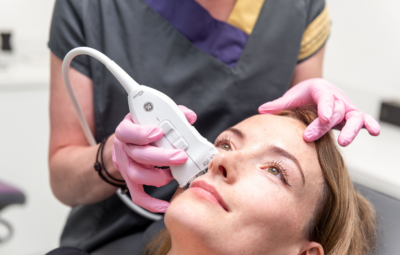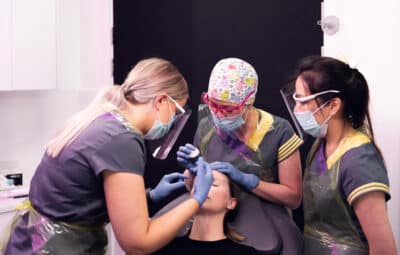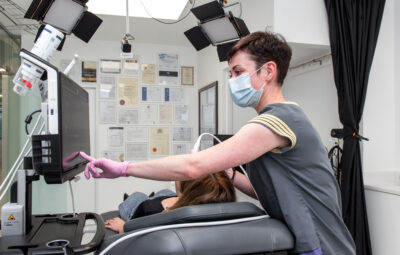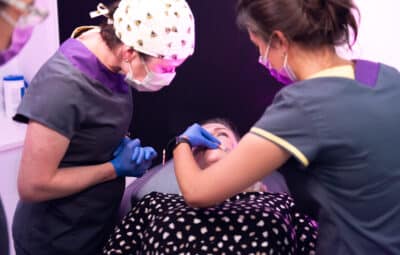
New Regulations for Aesthetics 2024: What We Know So Far
24 October 2024
Update for 2025: The landscape of UK aesthetic regulations continues to evolve, but progress remains slow. For the latest developments and what they mean for practitioners, read our New Aesthetics Regulations for 2025 update.
In this post:
- Why patient safety concerns have driven the UK government to propose new aesthetic regulations for non-surgical treatments.
- The key areas of the proposed regulations, including a new licensing scheme, age restrictions, and mandatory training standards.
- What these regulations mean for both existing and new practitioners, and how to start preparing now.
- How patients can protect themselves in the interim by choosing qualified practitioners and ensuring safety while the regulations are still pending implementation.
Non-surgical cosmetic treatments only continue to soar in popularity. From Botox to dermal fillers to laser treatments, more people are turning to these procedures than ever before. In the UK, it’s estimated that a staggering 11% of the population is getting non-surgical aesthetic treatments.
With this surge in popularity comes a big concern: patient safety.
In response to a growing amount of aesthetic complications, the UK government finally announced their proposal to tighten regulations and ensure higher standards across the industry in September 2023. Over a year later, it’s time to look at what’s progressed since then in 2024.
These new regulations still have yet to be implemented. When they are, they are expected to bring about major changes to the industry.
In this blog post, we’ll cover the proposed and new aesthetic regulations for 2024, what they mean for practitioners and patients, and what the next couple years will look like in the UK.

New Aesthetic Regulations for 2024 Explained
No longer are aesthetic treatments reserved for and kept secret by the rich and famous. Procedures like Botox, filler, chemical peels, and laser skin resurfacing are now widely accessible across high street beauty clinics and aesthetic centres. Currently, only Botox has restrictions placed on it as it is a prescription-only medicine. However, who can inject Botox is still not regulated.
The appeal of aesthetic treatments is far from surprising. Patients get quick results with minimal downtime, often at a fraction of the cost of traditional plastic surgery. Who wouldn’t want this?
But with the surge in popularity comes a rise in aesthetic complications. The truth is many of these procedures are being performed by unqualified or poorly trained practitioners in non-medical environments. Complications, ranging from infection to permanent damage, are becoming more and more common.
Influencers and social media are only bringing more attention to these treatments. While this otherwise would be a good thing, it unfortunately only attracts money-hungry practitioners to the industry who don’t have a full understanding of the risks involved.
Here at the Smileworks Aesthetic Training HUB, one of the values we instil on all our delegates is the importance of patient safety. Every UK practitioner and clinic should operate with this in mind. When a practitioner doesn’t have the right training, safety is among the first things to be overlooked.
The good news is the UK government has proposed regulations that aim to address these safety concerns. The goals are simple: improve safety standards across the industry and ensure that only qualified practitioners can perform these aesthetic treatments.
Before we dive into the regulations, it’s important to note that they are not yet in effect, and no official date for implementation has been set. Our hope is we see these regulations take effect within the next couple years, ideally in 2025.
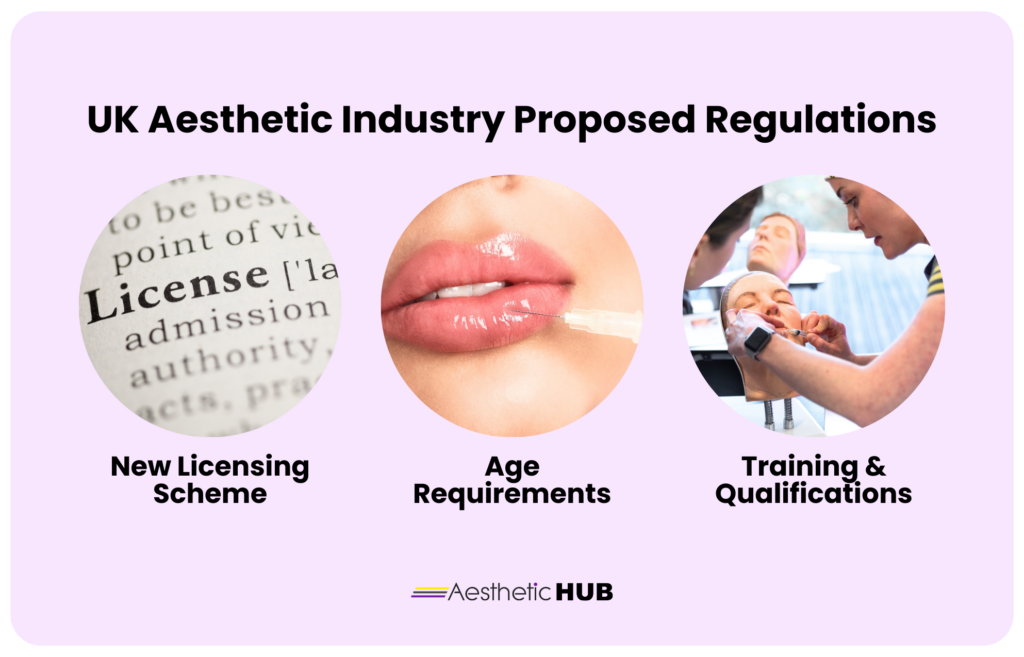
The Proposed Regulations Explained
So what exactly is on the table with these new regulations? The government’s proposals focus on several key areas, all designed to protect patients and raise industry safety standards.
New Licensing Scheme
One of the key aspects of the proposed regulations is the introduction of a licensing system. This would require both practitioners and the clinics from which they operate to be licensed. Specifically, the regulations aim to cover high-risk procedures including:
- Botulinum toxin (Botox) injections
- Dermal fillers
- Chemical peels
- Laser and energy-based treatments
The new scheme would mandate that only licensed practitioners–those who have undergone proper training and hold valid qualifications–can perform these procedures. Similarly, the premises from which they operate must meet hygiene and infection control standards to obtain a licence.
Age Restrictions
Another element of the new regulations is an age restriction on certain procedures. The government has proposed banning all high-risk cosmetic procedures for individuals under the age of 18, with expectations for medically necessary treatments performed by a healthcare professional.
This would align with existing laws that already prohibit Botox and dermal fillers for minors, including the Botulinum Toxin and Cosmetic Fillers (Children) Act of 2021.
Training and Qualifications
Perhaps one of the most critical aspects of the proposed regulations is the focus on required education and training. The Joint Council for Cosmetic Practitioners (JCCP) has been a key player in this regulatory effort. The JCCP has long advocated for mandatory training standards for all aesthetic practitioners. Under the proposed licensing system, practitioners would need to meet these national standards to ensure they are well-equipped to perform treatments safely and effectively.
The Role of the JCCP in Shaping Industry Standards
In their February 2024 public narrative, the JCCP laid out a comprehensive ten-point plan designed to guide the future of the industry. This includes mandatory education, clear definitions of medical vs. cosmetic procedures, tighter controls on advertising, and legal standards for indemnity insurance. While Botox advertising is regulated, dermal filler has no such controls.
The JCCP have worked closely with the government to co-develop the proposed licensing framework, ensuring it aligns with their safety-first approach. The proposed government regulations are expected to align with the JCCP’s vision of creating a safer and more accountable industry.
What Aesthetic Practitioners Need to Know Right Now
For practitioners already operating in the aesthetic industry, these proposed regulations will bring about a massive shift. Because the regulations have not yet been implemented, there is no need for immediate action. However, now is the time to start preparing for the changes that may come.
For Existing Practitioners
It’s crucial to start reviewing your current practices sooner rather than later. Are your qualifications up to date? Does your clinic meet the proposed hygiene and infection control standards? Ensuring compliance with these future requirements will put you ahead of the curve when the licensing scheme eventually takes effect.
Additionally, keeping up to date with the regulatory process is essential. The government has already opened consultations with industry stakeholders, but there could be more opportunities for practitioners to share their views or seek clarification on specific aspects of the proposed regulations.
For New Practitioners
If you’re considering a career in aesthetic medicine, it’s important to be aware of the training and qualification requirements that could soon become mandatory. Investing in high-quality training now will help you meet the future standards and obtain the necessary licences when the time comes. If a course’s price seems too good to be true, it probably is.
What Does This Mean for Patients?
For patients, these proposed regulations represent a welcome shift towards greater safety and transparency in the aesthetics industry. The goal with this proposal is to protect individuals from unsafe treatments performed by unqualified practitioners. Under these new guidelines, patients can rest assured knowing the practitioner they go to has the necessary training, insurance, and operates from a clean and hygienic environment.
But until the regulations are finalised, it’s unfortunately up to the patient to take the necessary precautions. They need to check their practitioners qualifications and ensure they are registered with reputable organisations like JCCP or Save Face. Additionally, patients should be cautious of too-cheap treatments. These come with hidden risks. Safety should always be your top priority when choosing a practitioner or clinic.
When Will Aesthetics be Regulated?
It’s impossible to say when these regulations will take effect. At the time of writing this blog post (October 2024), the timeline for implementation still remains uncertain. We can only assume and hope that the UK government is continuing to consult with stakeholders to refine the licensing scheme before introducing it to law.
The consultation process is expected to continue through the rest of 2024 and into 2025. This process will take time, and a transition period is expected once the regulations are finalised. The good news is this is the most headway the industry has made in years. We’re optimistic that the industry is moving toward a more regulated future, and changes will happen sooner than we may think.

Learn Aesthetic Medicine From The Pros
If you’re an aspiring aesthetic practitioner or a seasoned injector looking to refine your skills before the new regulations take effect, allow us to formally introduce ourselves. We’re the Smileworks Aesthetic Training HUB – an esteemed aesthetic training centre based in the UK. We pride ourselves on our wide range of online and hands-on courses tailored for every skill level.
Maybe you’re only just taking your first steps into the world of Botox and lip filler or you’re an advanced injector aiming to master facial ultrasound techniques. Perhaps you’re looking for more personalised one-to-one mentoring sessions. Regardless of your experience, the HUB has the expertise and courses to suit your needs.
It’s time to embrace the prospering world of aesthetic medicine. The HUB provides you with all the right training and guidance you need to succeed. Take control of your professional journey and step into a future filled with endless potential and opportunities.
Join us at the HUB. Let’s shape the future of aesthetic medicine together and ensure safe, effective, and transformative results for every patient.
Want to try out our courses before committing? Take advantage of our free trial for a taste of what learning at the HUB is like.
Related blog posts:
